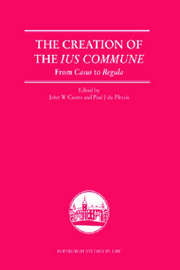Book contents
- Frontmatter
- Contents
- Preface
- List of Contributors
- List of Abbreviations
- Introduction
- 1 The Sources of Medieval Learned Law
- 2 The Infrastructure of the Early Ius Commune: The Formation of Regulae, or its Failure
- 3 Ius Quaerens Intellectum: The Method of the Medieval Civilians
- 4 Medieval Family and Marriage Law: From Actions of Status to Legal Doctrine
- 5 The Roman Concept of Ownership and the Medieval Doctrine of Dominium Utile
- 6 Succession to Fiefs: A Ius Commune Feudorum?
- 7 Towards the Medieval Law of Hypothec
- 8 The Ignorant Seller's Liability for Latent Defects: One Regula or Various Sets of Rules?
- 9 The Glossators' Monetary Law
- 10 Citations and the Construction of Procedural Law in the Ius Commune
- 11 Doctoribus bona dona danda sunt: Actions to Recover Unpaid Legal Fees
- Index
7 - Towards the Medieval Law of Hypothec
Published online by Cambridge University Press: 12 September 2012
- Frontmatter
- Contents
- Preface
- List of Contributors
- List of Abbreviations
- Introduction
- 1 The Sources of Medieval Learned Law
- 2 The Infrastructure of the Early Ius Commune: The Formation of Regulae, or its Failure
- 3 Ius Quaerens Intellectum: The Method of the Medieval Civilians
- 4 Medieval Family and Marriage Law: From Actions of Status to Legal Doctrine
- 5 The Roman Concept of Ownership and the Medieval Doctrine of Dominium Utile
- 6 Succession to Fiefs: A Ius Commune Feudorum?
- 7 Towards the Medieval Law of Hypothec
- 8 The Ignorant Seller's Liability for Latent Defects: One Regula or Various Sets of Rules?
- 9 The Glossators' Monetary Law
- 10 Citations and the Construction of Procedural Law in the Ius Commune
- 11 Doctoribus bona dona danda sunt: Actions to Recover Unpaid Legal Fees
- Index
Summary
INTRODUCTION
Accounts of the external history of the reception of Roman law and its contribution to the creation of the legal systems of Western Europe usually contain a number of stock narrative elements. Chief among these is the statement that the teaching of Roman law at medieval Italian universities from the twelfth century onwards and the associated scholarly endeavours of medieval jurists contributed significantly to the creation of a pan-European ius commune which, though it did not replace local customary law, in time proved instrumental in the formation of the legal systems of Western Europe. Although this statement continues to have broad academic support, it is often difficult to judge its accuracy since the study of medieval learned law has been hampered by the existence of obscure (unprinted) sources and fierce academic disagreements about methodology. In recent years, much progress has been made in this field of study. The publication of important bibliographical surveys such as those of Coing and Lange as well as the creation and dissemination of authoritative readings of important sources have greatly facilitated scholarly investigation into medieval learned law. Furthermore, individual scholars have made important contributions to modern understanding of the origins of specific legal doctrines in medieval legal scholarship.
While it cannot be denied that these scholars have made significant advances, it seems fair to state that much of recent scholarship on medieval learned law continues to focus on external factors (sources, changes to the text, textual transmission) rather than the law itself.
- Type
- Chapter
- Information
- The Creation of the Ius CommuneFrom Casus to Regula, pp. 159 - 174Publisher: Edinburgh University PressPrint publication year: 2010



